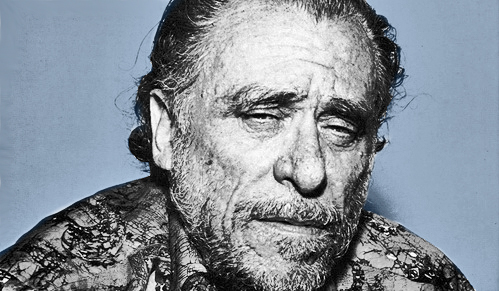
Below, Charles Bukowski writes to the editors of The L.A. Free Press, defending a story he had published in their pages two weeks prior. The story—”a take-off on an interview with an established female poet in a recent issue of Poetry Now”—had been denounced in a letter by fellow poet Lynne Bronstein, who accused Bukowski of a deep contempt for female poets. “Could it be,” wrote Bronstein, “that the male is ‘washed-up’ as an artist, that he has no more to say except in his jealousy, to spit on the young idealists and the newly freed voices of women?”
TO THE EDITORS OF THE L.A. FREE PRESS
November 15, 1974
Hello editors:
Regarding the Lynne Bronstein letter of Nov. 15 about my story of Nov. one:
1. The story was about pretentiousness in art. The fact that the pretender had female organs had nothing to do with the story in total. That any female made to look unfavorable in a story must be construed as a denunciation of the female as female is just so much guava. The right of the creator to depict characters any way he must remains inviolate—whether those characters are female, black, brown, Indian, Chicano, white, male, Communist, homosexual, Republican, peg-legged, Mongolian and/or?
2. The story was a take-off on an interview with an established female poet in a recent issue of Poetry Now. Since I have been interviewed for a future issue of the same journal and for future editions of Creem and Rolling Stone, my detractors will get their chance to see how I hold or fail under similar conditions.
3. When the narrator lets us know that he has Janice Altrice’s legs in mind might infer more that he is bored with the poetry game, and also might infer that he could have a poolhall, dirty joke mind, at times. That the narrator might be attacking himself instead of trying to relegate the lady back to a “sex object” evidently is beyond the belief of some so-called Liberated women. Whether we like it or not, sex and thoughts of sex do occur to many of us (male and female) at odd and unlikely times. I rather like it.
4. That “she is indeed speaking for Bukowski himself, who has expressed a similar contempt for unknown poets who give each other support.” The lady spoke for herself. Her “contempt” was toward poets not academically trained. My dislike is toward all bad poetry and toward all bad poets who write it badly—which is most of them. I have always been disgusted with the falsity and dreariness not only of contemporary poetry but of the poetry of the centuries—and this feeling was with me before I got published, while I was attempting to get published, and it remains with me now even as I pay the rent with poesy. What kept me writing was not that I was so good but that that whole damned gang was so bad—when they had to be compared to the vitality and originality that was occurring in the other art forms. —As to those who must gather together to give each other support, I am one with Ibsen: “the strongest men are the most alone.”
5. “Now that he’s well-known and the only southern California poet published by Black Sparrow Press, he thinks that nobody else is entitled to be a poet—especially women.” My dear lady: you are entitled to be whatever you can be; if you can leap twenty feet straight up into the air or sweep a 9 race card at the Western harness meet, please go ahead and do so.
6. “A lot of us think there’s more to write poetry about than beer drunks, hemorrhoids, and how rotten the world is.” I also think there’s more to write poetry about than that and I do so.
7. “Female artists, on the other hand, try to be optimistic.” The function of the artist is not to create optimism but to create art—which sometimes may be optimistic and sometimes can’t be. The female is bred to be more optimistic than the male because of a function she has not entirely escaped as yet: the bearing of the child. After passing through pregnancy and childbirth, to call life a lie is much more difficult.
8. “Could it be that the male is ‘washed-up’ as an artist, that he has no more to say except in his jealousy, to spit on the young idealists and the newly freed voices of women?” Are these the thought concepts you come up with in you “ego-boosting” sessions? Perhaps you’d better take a night off.
9. “Poetry is an art form. Like all art forms, it is subjective and it does not have sex organs.” I don’t know about your poems, Lynne, but mine have cock and balls, eat chili peppers and walnuts, sing in the bathtub, cuss, fart, scream, stink smell good, hate mosquitoes, ride taxicabs, have nightmares and love affairs, all that.
10. “…without being negative…” I thought they’d long ago ridden this horse to death; it’s the oldest of the oldest hats. I first heard it around the English departments of L.A. high school in 1937. The inference, when you call somebody “negative,” is that you completely remove them from the sphere because he or she has no basic understanding of life forces and meanings. I wouldn’t be caught using that term while drunk on a bus to Shreveport.
11. I don’t care for Longfellow or McKuen either, although they both possess (possessed) male organs. One of the best writers I knew of was Carson McCullers and she had a female name. If my girlfriend’s dog could write a good poem or a decent novel I’d be the first to congratulate the beast. That’s Liberated.
12. Shit, I ought to get paid for this.
Charles Bukowski
+


